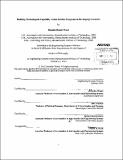| dc.contributor.advisor | Annalisa Weigel. | en_US |
| dc.contributor.author | Wood, Danielle Renee | en_US |
| dc.contributor.other | Massachusetts Institute of Technology. Engineering Systems Division. | en_US |
| dc.coverage.spatial | d------ | en_US |
| dc.date.accessioned | 2013-07-10T14:49:58Z | |
| dc.date.available | 2013-07-10T14:49:58Z | |
| dc.date.copyright | 2012 | en_US |
| dc.date.issued | 2012 | en_US |
| dc.identifier.uri | http://hdl.handle.net/1721.1/79502 | |
| dc.description | Thesis (Ph. D.)--Massachusetts Institute of Technology, Engineering Systems Division, 2012. | en_US |
| dc.description | Vita. Cataloged from PDF version of thesis. | en_US |
| dc.description | Includes bibliographical references. | en_US |
| dc.description.abstract | Global participation in space activity is growing as satellite technology matures and spreads. Countries in Africa, Asia and Latin America are creating or reinvigorating national satellite programs. These countries are building local capability in space through technological learning. They sometimes pursue this via collaborative satellite development projects with foreign firms that provide training. This phenomenon of collaborative satellite development projects is poorly understood by researchers of technological learning and technology transfer. The approach has potential to facilitate learning, but there are also challenges due to misaligned incentives and the tacit nature of the technology. Perspectives from literature on Technological Learning, Technology Transfer, Complex Product Systems and Product Delivery provide useful but incomplete insight for decision makers in such projects. This work seeks a deeper understanding of capability building through collaborative technology projects by conceiving of the projects as complex, socio-technical systems with architectures. The architecture of a system is the assignment of form to execute a function along a series of dimensions. The research questions explore the architecture of collaborative satellite projects, the nature of capability building during such projects, and the relationship between architecture and capability building. The research design uses inductive, exploratory case studies to investigate six collaborative satellite development projects. Data collection harnesses international field work driven by interviews, observation, and documents. The data analysis develops structured narratives, architectural comparison and capability building assessment. The architectural comparison reveals substantial variation in project implementation, especially in the areas of project initiation, technical specifications of the satellite, training approaches and the supplier selection process. The individual capability building assessment shows that most trainee engineers gradually progressed from no experience with satellites through theoretical training to supervised experience; a minority achieved independent experience. At the organizational level, the emerging space organizations achieved high levels of autonomy in project definition and satellite operation, but they were dependent on foreign firms for satellite design, manufacture, test and launch. The case studies can be summarized by three archetypal projects defined as "Politically Pushed," "Structured," and "Risk Taking." Countries in the case studies tended to start in a Politically Pushed mode, and then moved into either Structured or Risk Taking mode. Decision makers in emerging satellite programs can use the results of this dissertation to consider the broad set of architectural options for capability building. Future work will continue to probe how specific architectural decisions impact capability building outcomes in satellite projects and other technologies. | en_US |
| dc.description.statementofresponsibility | by Danielle Renee Wood. | en_US |
| dc.format.extent | 354 p. | en_US |
| dc.language.iso | eng | en_US |
| dc.publisher | Massachusetts Institute of Technology | en_US |
| dc.rights | M.I.T. theses are protected by
copyright. They may be viewed from this source for any purpose, but
reproduction or distribution in any format is prohibited without written
permission. See provided URL for inquiries about permission. | en_US |
| dc.rights.uri | http://dspace.mit.edu/handle/1721.1/7582 | en_US |
| dc.subject | Engineering Systems Division. | en_US |
| dc.title | Building technological capability within satellite programs in developing countries | en_US |
| dc.type | Thesis | en_US |
| dc.description.degree | Ph.D. | en_US |
| dc.contributor.department | Massachusetts Institute of Technology. Engineering Systems Division | |
| dc.identifier.oclc | 849739475 | en_US |
